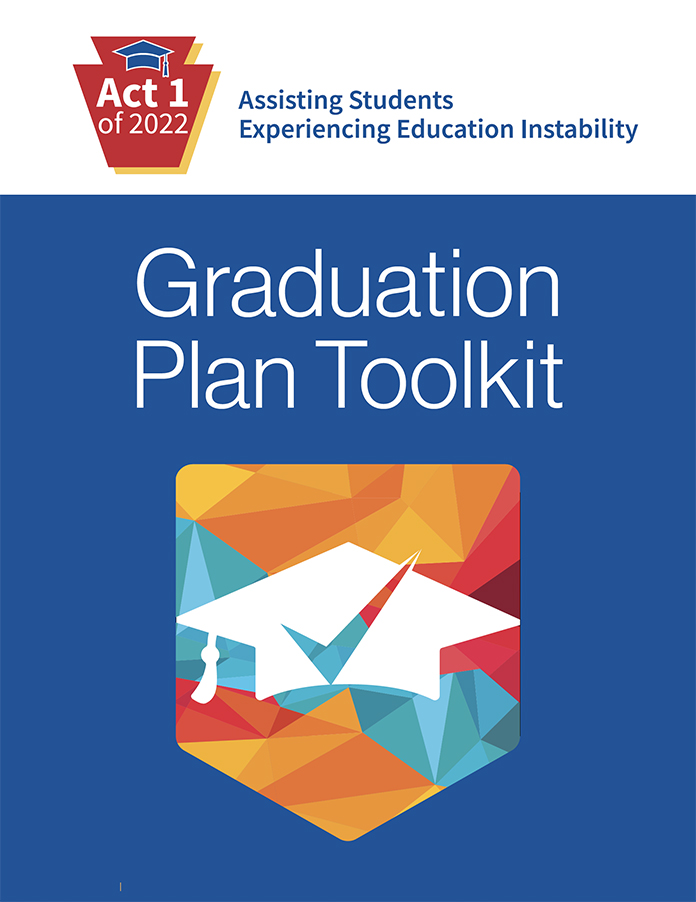
Act 1 of 2022 (Act 1) establishes clear responsibilities for school entities to support students experiencing educational instability, ensuring they have equitable access to academics and extracurricular activities. The law promotes proactive planning and assessment to help students stay on track for timely high school graduation. By removing barriers, addressing individual needs, and providing essential support, Act 1 strengthens protections for Pennsylvania’s most vulnerable students, reinforcing the state’s commitment to educational stability and success.
The Pennsylvania Department of Education, in collaboration with the Center for Schools and Communities, is dedicated to helping schools accurately identify all students eligible for Act 1 of 2022 and ensuring they receive the full benefits of the law.
Benefits Act 1 Provides Eligible Students





Eligibility
A student experiencing “educational instability” is a student who has one or more changes in school entity enrollment during a single school year as a result of any of the following:
Children and youth experiencing homelessness
Homelessness, as defined in the McKinney-Vento Homeless Assistance Act and as determined by the school entity.
Children and youth in foster care placement
An adjudication of dependency under 23 Pa.C.S. Ch. 63 (relating to child protective services) and 42 Pa.C.S. Ch. 63 (relating to juvenile matters).
Court-involved children and youth relating to juvenile delinquency
An adjudication of delinquency under 23 Pa.C.S. Ch. 63 and 42 Pa.C.S. Ch. 63 as disclosed at the discretion of the parent or guardian of the student.
An adjudication as part of court-ordered services under a voluntary placement or custody agreement.
Act 1 applies to students who meet the criteria above, regardless of whether they have returned to their former school, started at a new school, or re-engaged in school after an extended absence.
Importantly, Act 1 does not alter or undermine the rights of students with disabilities or conflict with other state or federal laws protecting eligible students.
To Which Schools Does Act 1 Apply?
Act 1 requires that all school entities in Pennsylvania must identify and provide support for all students who are eligible.
The law defines school entities as any of the following:
- School districts
- Charter schools
- Regional and cyber charter schools
- Intermediate units
- Career and technical schools

Identification
School entities must be flexible in determining eligibility based on minimal documentation. Students may be identified by a number of professionals working with school-age children and youth including but not limited to:
- School Homeless Liaison
- School Foster Care Point of Contact
- County Children and Youth Agency Education Liaison or caseworker/case manager
- Shelter providers
- Outreach workers
- Juvenile probation officers
- Staff at residential facilities
School entities must keep eligibility information confidential, including ensuring that an assigned Point of Contact or other administrative staff does not disclose the basis of a student’s eligibility to other school staff without permission from the student, while allowing the student to access all services, supports and protections of the law.
School Entity Responsibilities
School entities must develop clear policies and procedures to ensure equal access to educational activities, extra-curricular activities, and school-sponsored events. In addition, school entities must adopt policies regarding credit assessments and progress towards graduation. To meet these requirements, schools must:
- Assign a Point of Contact to all eligible students.
- Eliminate fees and fines that would otherwise be assessed against a student.
- Assess all prior work and award credits.
- Assess graduation progress including developing a student-specific graduation plan for students in grades 9-12.
- Allow students to participate in school events even if students could not meet the registration deadline due to attending a prior school.
Meet Your Support Team

Benjamin Simmons
Youth Development Specialist
Center for Schools and Communities
bsimmons@csc.csiu.org
Act1Training@csc.csiu.org
717-763-1661, Ext. 110

Meghan Dale
Special Projects Managing Coordinator
Center for Schools and Communities
mdale@csc.csiu.org
Act1Training@csc.csiu.org
717-763-1661, Ext. 121

Matthew Butensky
Youth Development Project Manager
Center for Schools and Communities
mbutensky@csc.csiu.org
Act1Training@csc.csiu.org
717-763-1661, Ext. 171

